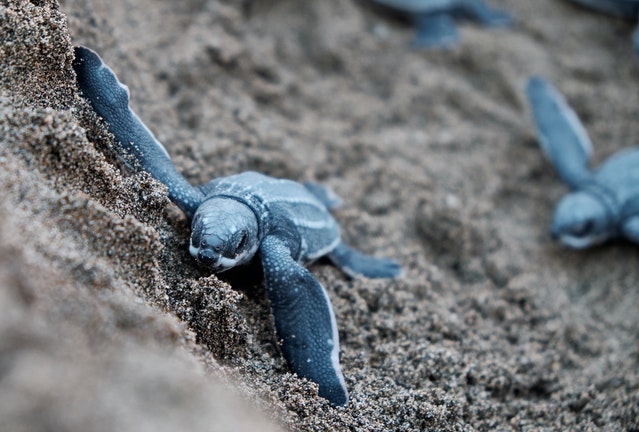
BARBADOS is a pioneer in environmental preservation, from banning single-use plastics in early 2019 to setting an energy goal of becoming fully carbon neutral by 2030. Visitors will be enticed by the sustainable and seaside restaurant La Cabane – utilizing nearly 100% of its food locally and choosing chic, minimal décor. Its focus is not truly food but health – implementing wellness activities alongside food, from paddle boarding to meditation.
A truly magical option for visitors is to participate in a turtle’s journey to the ocean. The Turtle Protection Group assists baby turtles with safely making way to the ocean, ensuring a higher survival rate. The protection group is devoted to educating locals and visitors about sea turtle biology, conservation efforts and research. Many hotels work with the group to allow visitors to assist in these efforts.
Not only do the white sand beaches and warm temperatures tempt visitors, but the wildlife refuge and sanctuaries offer a unique experience in this paradisiacal destination. The Caribbean Sea’s Carlisle Bay and Folkestone Marine Park are two of Barbados’ marine sanctuaries that strive to preserve the island’s ocean life and natural beauty. On land, the Barbados Wildlife Reserve is where animals are protected
BELIZE is a country that proudly strives to protect and preserve its vast biodiversity and distinctive ecosystems. In 2021, a major deal was confirmed where Belize will be able to protect 30 percent of its ocean territory.
A UNESCO World Heritage Site, the Belize Barrier Reef, is the prime example of protecting sustainability, with 500+ species of fish and nearly 300 kilometres of coral reef. The Central American destination strives to protect and sustain its biodiversity through natural reserves, such as Mountain Pine Ridge Forest Reserve, which is comprised of 300K acres of protected pine forest and home to the sublime Big Rock Falls.
Belize encourages responsible travel by asking visitors to explore all that the reef has to offer with respect (i.e. choosing reef-safe sunscreen, avoiding contact with the reef, etc.). The Responsible Tourism in the Belize Barrier Reef is a guide to assist visitors in making environmentally friendly decisions. From eating sustainable seafood to choosing eco-conscious accommodations, this guide offers ways to visit that lessens the impact on nature.
MIAMI is a city with sustainability at heart, from green building codes to sustainable restaurants, and much more. The Everglades National Park, a UNESCO World Heritage Site and a Wetland of International Importance , spans 1.5 million acres of diverse ecosystems (and is the only place in the world where alligators and crocodiles live together!). Visitors can check out Ranger talks and special programs which are scheduled throughout the year, and on Saturday, April 23, “Junior Rangers” can participate in Earth Art Programs.
Nature lovers can delight in a variety of ranger- or naturalist-led tours – by tram, bicycle, kayak, canoe and more – at more area parks such as Biscayne National Park, Oleta River State Park and Crandon Park.
If checking out the city while making more environmentally friendly choices if your thing, Miami’s goal to reduce car fuel emissions has paved the way for increased cycling within the city. Visitors and locals are encouraged to explore with public bikes with the recent major expansion of cycling trails throughout the destination.
For travel inspiration, check out more events surrounding this year’s Earth Day in Miami.
CALIFORNIA
R-E-S-P-E-C-T, do you know what that means for California? While it might make you sing like Aretha Franklin all day, it’s a truly smart code of conduct that the destination established to encourage sustainable travel. Roam Responsibly, Educate Myself, Safety First, Preserve California, Embrace Community, Celebrate Culture, Teach Others. This is part of Visit California’s published draft of Destination Stewardship and Sustainable Travel Plan, a key step to establish California as a leader in sustainable tourism.
California is renowned for its farm to fork culture, a highlight of its eco-friendly foundation as a destination. To encourage sustainable travel, Yosemite National Park is taking a multi-tiered approach through messaging to come during weekday, avoid midday, use buses or carpool rather than your private car, as well as consolidating parking spaces and building a new welcome centre.
Sonoma County is offering visitors the opportunity to sleep sustainably through booking platform “Give + Get. By using their booking platform, visitors can stay at places that are giving back to the community through sourcing local artisan products for their restaurants and making efforts to eliminate plastic usage.





